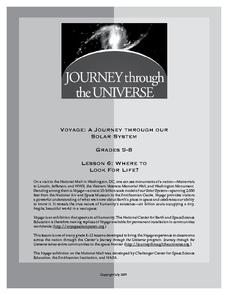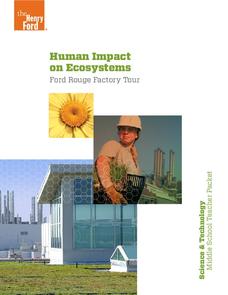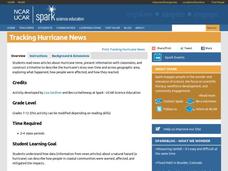American Chemical Society
The Periodic Table and Energy-Level Models
Teach your class to think of electrons as tiny packets of energy that travel in waves. Through a short video and diagram, participants see how electrons are located around the nucleus of an atom. They then get into groups and try to...
American Chemical Society
Temperature Changes in Dissolving
Alia-Seltzer tablets cause a very obvious chemical change, but do they also cause a temperature change? Each class member explores hot/cold packs, discussing how these temperature changes occur. Groups then design and carry out their own...
American Chemical Society
Why Does Water Dissolve Salt?
Individuals explore solubility by modeling how water dissolves salts. They then view a video and compare how well water and alcohol dissolve salts, relating their comparisons to the structure of each molecule.
American Chemical Society
Surface Tension
A drop of dew holds a sphere shape even when sitting on a seat thanks to the surface tension of water. Learners observe the phenomena of surface tension in water. Through demonstrations, hands-on activities, and discussions they explore...
American Chemical Society
Protons, Neutrons, and Electrons
Atomic bombs harness the power in the nucleus of an atom, creating devastating power and damage. Classes review parts of an atom by charging a piece of plastic and holding it near their fingers, discussing what is happening and why....
American Chemical Society
Can Liquids Dissolve in Water?
How does food coloring work? Classes watch a demonstration showing liquids dissolving in liquids. In groups, they then explore the ability of other liquids to dissolve in water (alcohol, mineral oil, and corn syrup) by setting up and...
American Chemical Society
Why Does Water Dissolve Sugar?
Did you know that if you wait long enough, the M on the outside of an M and M will float to the surface when submerged in water? Learners observe the sugar coating of an M and M while it is dissolving in water. They explain how this...
American Chemical Society
Changing State: Condensation
When you have a cold drink and you notice the water forming on the outside, it is literally pulling the water from the surrounding air to form the condensation. After watching a demonstration of condensation forming on a glass,...
Curated OER
Sustainability and Extinction
Galapagos Penguins are the only penguins on earth that live north of the equator (in the wild). In this last lesson plan a discussion on how the Galapagos islands developed their populations and diversity sparks the introduction. Two...
NASA
Biology Training Conclusion
Gravity is just one consideration when determining human habitability on a new planet. The instructional activity connects four different units and starts with connecting the various systems: planetary systems, human body systems, etc....
Centers for Disease Control and Prevention
Teach Mrs. Jones' Class about Microbes
During a biology lesson, scholars research microbes, design a lesson plan using an outline, and present the lesson to the class.
Journey Through the Universe
Where to Look For Life?
Every year we discover new planets including more than 1,000 in 2016 alone. Will we ever find life on another planet? The lesson includes two activities to help scholars understand this concept. First, they analyze the temperature range...
NASA
Einstein and His Times
Scholars research and present on the historical happenings of 1919. After sharing their findings, pupils debate about how Congress dealt with the moral issues of the time. The evaluation asks learners to write a persuasive essay...
Henry Ford Museum
Human Impact on Ecosystems
An environmenta science unit includes three lessons plus a cumulative project covering the ecosystem. Scholars follow the history of the Ford Rouge Factory from its construction on wetlands and how it destroyed the environment to its...
Chemical Education Foundation
Teacher's Guide to Science Projects
Do you find the idea of having a science fair with all of your students intimidating? Use a guide that provides everything you need to know to make project-based learning manageable. The resource includes options for four different types...
Federal Reserve Bank
It's Your Paycheck
Beyond reading and arithmetic, one of the most important skills for graduating seniors to have is fiscal literacy and responsibility. Start them on the right financial track with nine lessons that focus on a variety of important personal...
Howard Hughes Medical Institute
EarthViewer
Can you imagine Washington DC and London as close neighbors occupying the same continent? Learners will be fascinated as they step back in time and discover the evolution of the earth's continents and oceans from 4.5 billion years ago to...
Federal Reserve Bank
Invest in Yourself
What are the different ways that people can invest in their human capital for a better future? Pupils participate in an engaging hands-on activity and analyze data regarding unemployment, the ability to obtain an education, and median...
Government of South Australia
Don't Waste Your Energy
Don't lift another finger, this physical and environmental science unit has everything you need to begin teaching your class about energy. Starting with a look at the greenhouse effect, these lessons and activities take young scientists...
Norwich Institute for Language Education
Simple Machines
Planning a unit on simple machines? Save some time and energy with this collection of lessons and activities that explores how these devices are used in the real world to make life a little easier.
National Endowment for the Humanities
Galileo: Revealing the Universe
To gain an understanding of the significance of Galileo Galilei's revolutionary ideas, class members watch the short video "Stargazing Before Galileo," and conduct a close reading of Galileo's Sidereal Messsenger. They then compare...
Center Science Education
Tracking Hurricane News
Here is a unique twist for your lesson on hurricanes. After examining extreme weather news headlines, your storm chasers view a PowerPoint about hurricanes and then zoom in on Hurricane Irene. They map a timeline of her trek up the East...
Center Science Education
Weather in the News
Tornadoes, blizzards, and hurricanes, oh my! In this activity, meteorology majors compare stories of historical storms written by two or more different sources. As a result, they understand how the media portrays such catastrophes and...
Berkeley Engineering and Mentors
Egg Drop
How do different shapes affect the outcome associated with hard impact? All you need is an egg and some recycled materials to find out. Kids experiment to understand how airbags work to lessen the impact of two different types of...

























